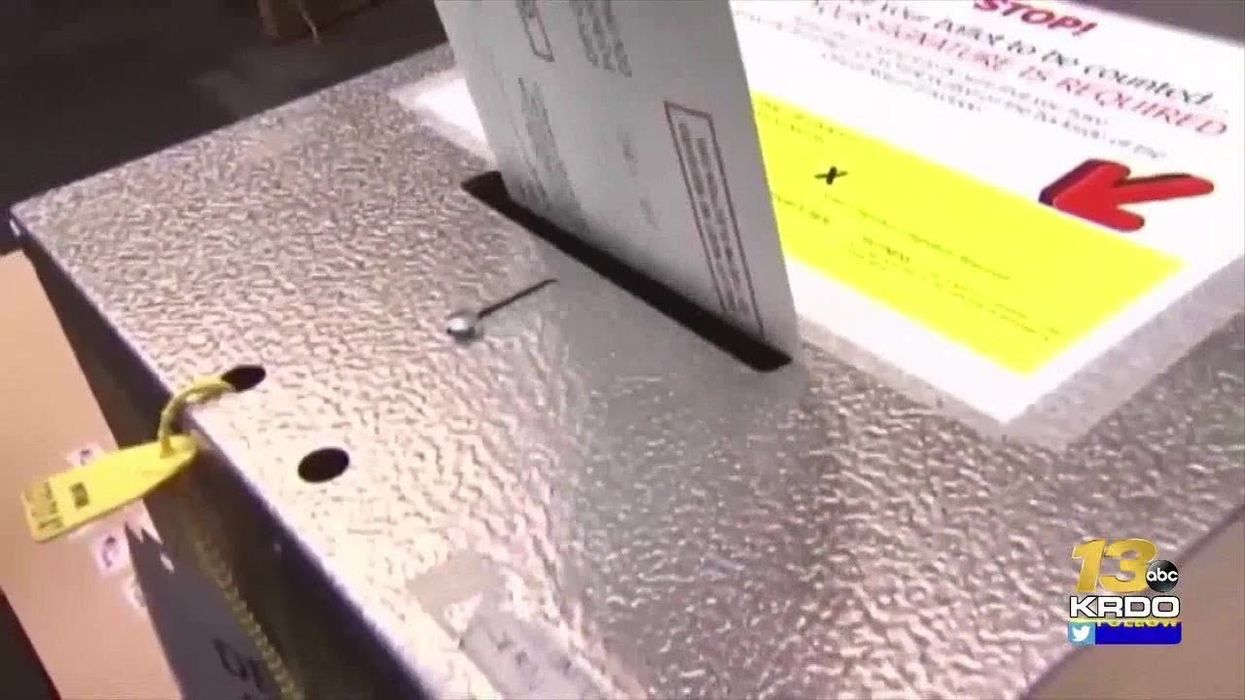Coloradans will finish voting next week on whether to support using the popular vote to elect the president. It's a close call, but let's hope they do.
The ballot initiative follows Colorado's decision last year to join 14 states and Washington, D.C., as a member of what's called the National Popular Vote Interstate Compact — pledging their Electoral College votes to the winner of the nationwide popular vote, but only once states with a combined 270 electoral votes (the majority guaranteeing election) have signed on. The current group commands 196 votes.
But shortly after Democratic Gov. Jared Polis signed the law, opponents launched a "veto referendum" campaign and gathered 100,000 more signatures than the 125,000 required to put the measure on this fall's ballot. Voters will now have the chance to affirm or reverse the state's decision. Nearly $6 million has already been spent on the campaign, with three of every four dollars spent by people wanting to remain in the compact.
(By the way, 22 states provide an avenue for the citizenry to repeal a state law. Colorado last saw its version used in 1932.)
Coloradans have good reasons to vote "Yes," which means sticking with the popular vote compact. Doing so would support the principle of every one person having one vote, which the Electoral College tramples. And it would encourage turnout, which the Electoral College disincentivizes in the solid majority of states that year after year remain reliably Republican red or Democatic blue. (Voter participation was 11 percent less in the "safe" states, on average, than in the battlegrounds of 2012, for example.)
If the compact takes over how presidential elections are decided, effectively neutering the Electoral College as we now know it, that would end the practice of candidates making all their campaign appearances in the relative handful of competitive states. And it would bring an end to so-called misfire elections, when the Electoral College winner prevails despite losing the popular vote.
Voting "Yes," however, would eventually prove to be only a symbolic decision — because the compact itself is fatally compromised.
The critical flaw is not about using the popular vote. It is not the deal's total lack of bipartisan support at the moment, Colorado being the only remotely purple place on a list that's otherwise all deep blue. And it is not the pact's potential unconstitutionality, because courts may decide it needs congressional approval, which it does not have, or is an improper diversion around the Constitution.
These concerns are irrelevant, as are the problems from sticking with winner-take-all, plurality outcomes.
What matters is that, if ever implemented, the compact would crumble at first use.
This design instability starts with the compact going into effect once states representing 270 electors sign on. Participating states may not leave the compact in the six months before each national election, but they can do so afterwards. If even just one or two states decides to leave after the first election under the compact, the total number of electors from participating states would likely fall below the magic number, thus killing the compact.
Would states drop out this way? Assuredly. Just consider Maryland, the first state to join the compact in 2007. If the reliably Democratic electorate ever witnesses its 10 electoral votes awarded to a Republican winner of the national vote — irrespective of whether the election is close — do you think Maryland voters or their representatives would allow that to happen again?
Or consider 2004, when Democratic Sen. John Kerry would have cinched an Electoral College majority had he overcome only a 120,000-vote gap in Ohio. He would still have lost the national popular vote by 3 million. Had the compact been in effect, how do you think voters in Ohio, or in blue California and New York, would have reacted if their electoral votes went to the re-election of President George W. Bush?
Yes, some would support political equality and defend reliance on the national popular will. But would there be enough of them, and would they be loud and strong enough to prevail?
Such scenarios could play out in any blue or red state where residents might conclude their votes were subverted. Contributing to this flaw is the simple truth that, by preserving the Electoral College and its structure, the compact signals to voters that their states still matter — the opposite of what the NPVIC advocates.
If the compact ever gets close to membership by states with more than 270 electors, this implementation problem will get heightened scrutiny. No new states would sign on. Existing participants would drop out. In other words, the NPVIC is destined to die before it ever has a chance to live.
I would still vote "Yes" on Proposition 113 if I lived in Colorado. The compact's sustained civic education and engagement value is real and merits appreciation if not support.
Ultimately, however, a constitutional problem requires a constitutional solution. That means an amendment, the daunting path the NPVIC explicitly avoids. At some point, pursuing the compact became (or will become) a diversion from the only course leading to the desired destination.
A transition to a goal of eliminating rather than modifying the Electoral College is needed. That could be expedited by more misfire elections, or dramatically boosted by this nightmare occurring: No candidate secures 270 electoral votes and the election is thrown to the House, where each state's delegation would have one vote.
Amending the Constitution to change how we select the president remains unimaginable now. But political reality could be different in a decade — or in 2037, the Constitution's 250th anniversary. Truly celebrating that milestone will require removing the stain of the Electoral College.




















Trump & Hegseth gave Mark Kelly a huge 2028 gift